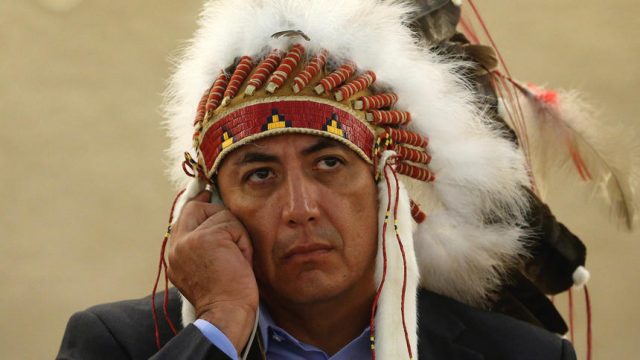It Doesn’t Matter That Standing Rock Voiced Opposition to DAPL at a Meeting in 2014

Dave Archambault II, chairman of the Standing Rock Sioux tribe, waits to give his speech against the Energy Transfer Partners' Dakota Access oil pipeline during the Human Rights Council at the United Nations in Geneva, Switzerland September 20, 2016. REUTERS/Denis Balibouse
The new talking point for people grasping at reasons to justify the violent, unlawful rioting aimed at the Dakota Access Pipeline is audio from a meeting of the Standing Rock tribal council back in September 2014 during which the tribe said they’re opposed to oil pipelines.
Supposedly this contradicts a consistent criticism of the tribe’s position on the pipeline, specifically that they did not participate in the regulatory process despite repeated invitations to do so.
It doesn’t. This cherry-picked audio changes exactly nothing.
Interestingly, the tribe just released this audio a couple of weeks ago, making me think they probably just remembered they had it. They’ve put it up on YouTube if you care to listen:
https://www.youtube.com/watch?v=XARJFdyyfac
“We recognize our treaty boundaries from 1851 and 1868, and because of that, we oppose the pipeline. We have a standing resolution passed in 2012 that opposes the pipeline within that treaty boundary,” Chairman David Archambault can be heard telling representatives of Energy Transfer Partners, the company building the Dakota Access Pipeline. “This is something that the tribe is not supporting.”
The 2012 resolution was one passed by many tribes around the nation at the behest of the Indigenous Environmental Network. It expresses general opposition to pipelines and fracking.
Archambault’s invocation of that resolution in the 2014 meeting is utterly irrelevant, because subsequent to that one meeting the Standing Rock Sioux tribe largely did not participate in the regulatory process around the pipeline despite specifically being invited to do so.
They did not attend any of the three public hearings the North Dakota Public Service Commission held on the pipeline, nor did the tribe submit written testimony to the state. The tribe also blew off multiple opportunities to participate in the regulatory process with the U.S. Army Corps of Engineers.
But don’t take my word for it. Federal Judge James Boasberg, an Obama appointee, provided a lengthy review of the meetings between the tribe, DAPL, and the Corps (including the September 30 meeting the audio for which is above) in his opinion rejecting the tribe’s request to enjoin construction back in September.
“Suffice it to say that the Tribe largely refused to engage in consultations,” Boasberg wrote in his opinion.
The tribe today is behaving as though they have a veto over the pipeline, but they don’t. The pipeline does not cross the reservation. The tribe is asserting that their authority extends beyond their current reservation to un-ceded treaty lands, but their expectations as to the scope of that land are ridiculous.
They argued in court that their land is “wherever the buffalo roamed.” I’m not at all kidding:
Is the tribe really expecting the courts to, in recognition of an injustice done to them over a century ago, perpetrate a modern injustice against the owners of millions upon millions of privately-owned acres by putting them under the jurisdiction of the Sioux?
Give me a break.
But even setting aside quibbling over what is and is not tribal land, there remains the fact that Standing Rock is part of the United States of America. The people there are U.S. citizens who vote in our state and federal elections. They are bound by federal law, just as the rest us are.
Federal law sets out an exacting, quite arduous process through which a pipeline such as the Dakota Access project is reviewed. The Standing Rock tribal government, per Boasberg’s opinion (which was upheld after a review by an appeals court), largely did not participate in that process despite a multitude of opportunities to do so.
That Chairman Archambault voiced opposition to the pipeline at one meeting in 2014 doesn’t change that. It may be a handy talking point to splash all over Facebook, but as a matter of law it is meaningless.
UPDATE: I just got this statement from Energy Transfer Partners spokeswoman Vicki Granado:
Mr. Warren has expressed in several recent interviews that he wished the Tribe had engaged in discussions regarding the pipeline project earlier in the process when they were invited to do so on a number of occasions. He did not say that we had never talked with them as some are claiming.
The Army Corps of Engineers has made similar comments regarding meetings that the Tribe either cancelled or simply chose not to show up. The North Dakota Public Service Commission has also stated that the Tribe did not attend the public meetings that were held to discuss the project, even though they were invited to do so. Furthermore, an Obama-appointed federal judge issued a 58-page opinion, which offered great detail on our efforts and those of the Corps to engage the tribe and concluded that the tribe declined to engage in any consultation.
As we have said before, we value and respect culture of all Native Americans and the significant role their culture plays in our nation’s history and its future. We wish they had elected to participate in the many discussions that took place during the last several years on this project as there may have been a different outcome than we have today. I think the recording demonstrates our willingness to work with them. Our doors were open and it is unfortunate that they did not choose to work with us. We hope that changes as we continue to move forward with this project.
Here’s Boasberg’s full opinion. If you haven’t read it, and you care to understand this issue, it’s worth your time. The facts simply do not support the tribe’s argument:
[scribd id=323471522 key=key-adHhqL7zDmzKlCYU97Lo mode=scroll]





